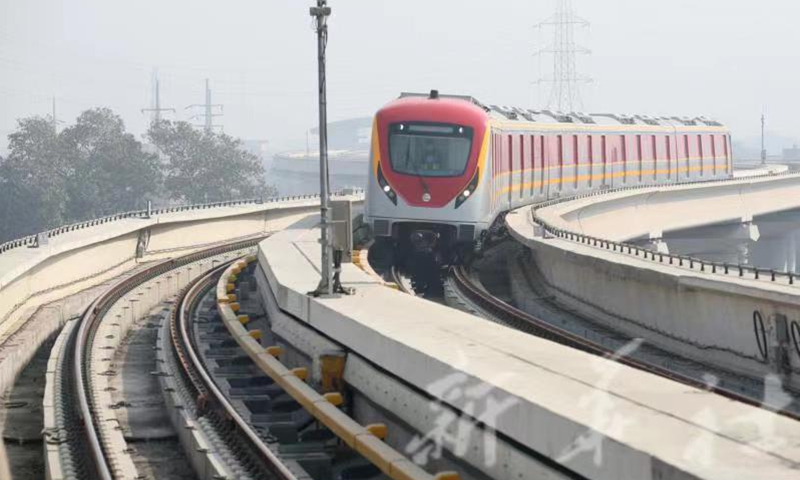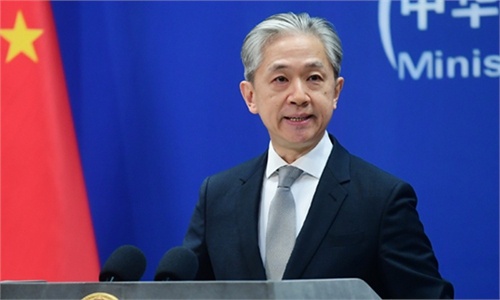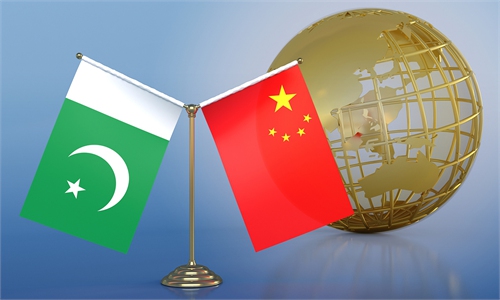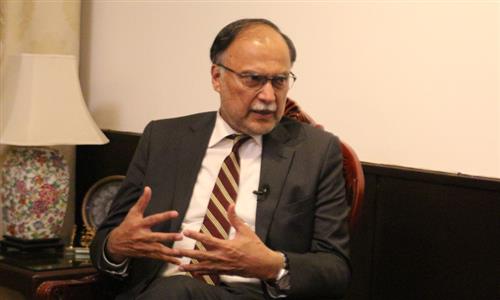Chinese Vice Premier He Lifeng visits Pakistan, celebrating CPEC's 10th anniversary
Motorways, power stations, ports being built, lifting local infrastructure

Photo taken on October 24, 2020 shows an Orange Line metro train pilot test run in Pakistan's eastern city of Lahore. The Orange Line Metro Train project is one of the CPEC early-harvest projects. Photo: Xinhua
Vice Premier He Lifeng, acting as the special envoy of Chinese President Xi Jinping, kicked off an official visit to Pakistan on Sunday to attend the Decade of China-Pakistan Economic Corridor (CPEC) celebrations.
The two countries, all-weather strategic cooperation partners, have enhanced comprehensive cooperation under the framework of the Belt and Road Initiative (BRI) during the past 10 years.
The CPEC is a flagship of the BRI, which has helped improve Pakistani people's livelihood, and created many jobs for locals, experts said, noting that Western countries' disparaging CPEC won't conceal Chinese enterprises' contribution to Pakistan nor hurt the iron-clad friendship of the two neighbors.
The Chinese Foreign Ministry said on Saturday that China hopes that He Lifeng's visit will be an opportunity to implement the important consensus reached between leaders of the two countries, continue to build on past achievements and upgrade the development of the CPEC.
The country also hopes that the visit will consolidate and deepen the China-Pakistan all-weather strategic partnership, advance the building of an even closer China-Pakistan community with a shared future in the new era, and contribute to the development and prosperity of the region.
"Before the launch of the CPEC, a signature project of the BRI envisaged by China, Pakistan was striving for economic survival, languishing in an energy crisis, with poor infrastructure and financial challenges. As a silver lining, the CPEC came to the rescue. Within 10 years, the initiative was transforming Pakistan and bringing prosperity," Yasir Habib Khan, senior journalist and president of the Institute of International Relations and Media Research, told the Global Times.
The corridor is a model of the two nations' adherence to joint construction and sharing of high-quality resources, which has promoted the socioeconomic progress of Pakistan, Li Yong, a senior research fellow at the China Association of International Trade, said on Sunday.
As of 2022, the CPEC had brought $25.4 billion in direct investment to Pakistan and created about 236,000 jobs there. It helped Pakistan generate 8,000 megawatts of electricity and build 886 kilometers of national core transmission grid, according to the Chinese Embassy in Pakistan.
While China and Pakistan have kept on promoting high-quality development of the CPEC, Western media use "debt trap" and "unqualified projects" to smear the BRI project.
"Facts speak louder than the smearing rhetoric. The achievements over the past 10 years in the construction of the CPEC are the best response to the 'debt trap' and other discrediting smears," Li told the Global Times.
One of the watershed developments during the 10 years was the high-octane operation of Gwadar Port, crown jewel of the CPEC.
Gwadar was once an old fishing town, and now it is on a high tide of success with tangible socioeconomic progress, including the establishment of free trade zones there, the Eastbay Express Way, and inauguration of the New International Gwadar Airport, according to Yasir.
Zhang Baozhong, former chairman of China Overseas Ports Holding Co, told the Global Times that with the improvement of local ports and infrastructure including hospitals, airports and schools, Gwadar has now been transformed to a modern seaside city with a permanent resident population that grew from 80,000 in 2013 to 220,000 in 2023.
Zhang said his company aims to build Gwadar into a smart port city by 2050 with a total population of more than 1.7 million and an annual GDP of $30 billion.
The Peshawar-Karachi Motorway (PKM), the largest transportation project under the CPEC, was completed in 2019. The project gave priority to hiring Pakistani employees, providing more than 23,000 local jobs, according to a statement China State Construction sent to the Global Times.
The PKM project has also helped propel the development of services industries such as catering, retailing and transportation, indirectly creating more than 45,000 jobs.
Danish, a manager of PowerChina's construction project group in Pakistan, told the Global Times that in the field of green energy, Pakistanis are impressed by the technology accumulation and construction efficiency of Chinese companies.
PowerChina has completed the construction of 22 wind power projects in Pakistan, with a total installed capacity of 1.14 million kilowatts.
In connection with the 10th anniversary of CPEC, the CPEC Industry Chain Cooperation Platform was launched to kick-start a comprehensive services system covering key industrial cooperation in new energy, smart manufacturing, and the digital economy between China and Pakistan.



